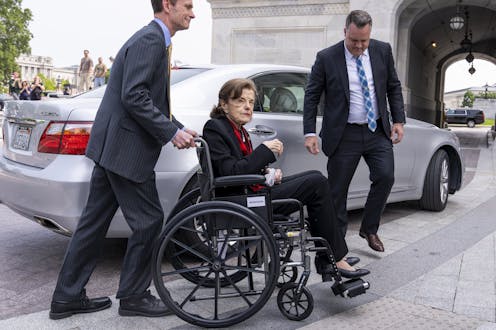Feinstein just the latest example of an old problem: Politicians have long been able to evade questi
Physical ailments and deteriorated health may be the one area in which politicians can escape scrutiny.

California Democratic Sen. Dianne Feinstein recently returned to the Senate after an almost three-month absence that – because she could not vote remotely and the Senate is closely divided – left the Democrats’ agenda in limbo.
Feinstein turns 90 in June and can barely walk on her own, and her mental acuity has been in question for many years. Yet she is holding on to her seat and won’t resign despite fervent pleas from some within her party.
Politicians are vulnerable when they’re accused of almost any impropriety real or imagined, but physical ailments and deteriorated health may be the one topic for which politicians can escape scrutiny.
Health, privacy and how to be trustworthy
Most people expect that their health is a private matter. And for a politician or candidate, such disclosures can be used as political weapons by their opponents. But when voluntarily entering the sphere of public service, does someone have an obligation to inform constituents about how well one is actually able to do the job?
Perhaps Feinstein – or her staff – knows that politicians can evade questions about their health practically with impunity. But politicians who are dodgy about their medical condition can put constituents at a disadvantage.
Ironically, according to my research, if Feinstein would come clean about her impairments, the media and public would probably be far more forgiving. But she seems intent on taking politicians’ all-too-common route of engaging in deceptive evasion. She loses trustworthiness when the public clearly sees her dodging questions. In her most recent interaction with reporters she was politely asked how she’s feeling. She said she’s fine except for a problem with her leg.
The reporter courteously asked what was wrong with her leg. She said “nothing that’s anyone concern but mine.” Then she repeatedly asserted, falsely, “I haven’t been gone” from the Senate, and her office appears to be further stonewalling when asked for follow-up or clarification.
By overtly deflecting reporters’ questions – about her leg and her absences – she is probably causing people to think and obsess even more about her inadequacies as an elected official, based on experiments I have conducted. If Feinstein demonstrated a sincere, pleasant demeanor instead of glaring at reporters, and provided transparent disclosures about her health, she would shift from being perceived as duplicitous to being trustworthy, based on experiments I have run.
Precedent for secrecy
Nonetheless, the default position for public figures – especially politicians – seems to be diversionary maneuvers to evade questions. And the reason may not just be a complicit partisan base that allows politicians to deceive with impunity. The media have long allowed politicians’ poor health to stay hidden.
History is full of examples of the media’s covering up politicians’ medical problems. That, in turn, exacerbates a common perception that reporters are complicit with politicians in concealing important information from the public.
Traditionally, reporters hate cover-ups. But the media seem to make an exception for health concerns. Reporters apparently consider it within the bounds of campaign job interviews to ask a politician whom he is having sex with, what type of underwear he wears, how many ex-girlfriends’ abortions he paid for and precisely how gay he is.
But reporters practically become snooty, high-brow puritans at the thought of asking politicians whether their health will allow them to show up to work.

Reporters in cahoots
Sen. Strom Thurmond did not retire until he was 100 years old, and reporters largely kept his cognitive ailments hidden. Like Feinstein, Thurmond often showed evidence of cognitive decline when speaking.
An extreme example of this phenomenon of politicians deceiving is provided by serial liar Rep. George Santos. Unlike most politicians who lie about their health to sound as if they are impervious to maladies, the New York lawmaker took the opposite approach while campaigning for Congress. Santos listed all sorts of health problems he suffers from: acute chronic bronchitis, a brain tumor, an immunodeficiency and susceptibility to cancer.
Most of Santos’ claims about his life other than his health have been fact-checked. After he was elected, the media thoroughly investigated and dispelled his claims ranging from saying he was Jewish to saying he had played college volleyball. But Santos’ statements about his own mental or physical abilities seem to have gone unquestioned. Santos was either lying or telling the truth about being unwell.
Either way, the public should have known.

Fit for office
It may be time to consider a politician’s health – literal, physical fitness for the office – to be fair game for disclosure. Asking politicians whether they have the ability to serve in office should not be off-limits, nor considered evidence of “ableism.”
If civil discussions of mental and physical health impairments can be held – rather than treated like stigmas that must be hidden – democracy would be healthier. The public should be able to expect their representatives to be able to show up to work and honestly serve their constituents. And that means reporters and the general public should ask the necessary questions of their elected officials.
This is an updated version of an article originally published March 3, 2023.
David E. Clementson does not work for, consult, own shares in or receive funding from any company or organization that would benefit from this article, and has disclosed no relevant affiliations beyond their academic appointment.
Read These Next
Winter Olympians often compete in freezing temperatures – physiology and advances in materials scien
While physical exertion helps athletes stay warm, sweating can lead to dehydration.
There’s a competition crisis in America’s state legislatures – and that’s bad for democracy
In dozens of states, an increasing number of legislative seats are going completely uncontested by one…
Aldi is coming to Colorado, and the disruption could lead to lower food prices
The grocer offers low prices and plans to build its own distribution center.





